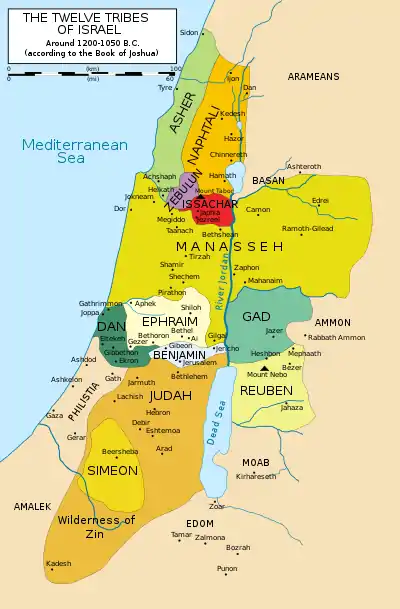Tribe of Issachar
According to the Hebrew Bible, the Tribe of Issachar (Hebrew: יִשָּׂשכָר/יִשְׂשָׂכָר, Modern: Yīśśaḵar/Yīś'šaḵar, Tiberian: Yīśśāšḵār/Yīś'šāḵār) was one of the twelve tribes of Israel and one of the ten lost tribes. In Jewish tradition, the descendants of Issachar were seen as being dominated by religious scholars and influential in proselytism.[1] The sons of Issachar, ancestors of the tribe, were Tola, Phuvah, Job and Shimron.[2]
| Tribes of Israel |
|---|
 |
| The Tribes |
| Related topics |


Biblical narrative

In the biblical narrative of the Book of Joshua, following the completion of the conquest of Canaan by the Israelite tribes, Joshua allocated the land among the twelve tribes. The territory allocated to Issachar stretched from the Jordan River in the east to Mount Carmel on the west, near to the Mediterranean coast, including the fertile Esdraelon plain between present-day Lower Galilee and Samaria. It was bounded on the east by East Manasseh, the south by West Manasseh, and the north by Zebulun and Naphtali.[1] There is a consensus among scholars that the accounts in the Book of Judges are not historically reliable.[4][5][6] Alternatively, scholars and historians such as Barry G. Webb believe Judges to be a challenging book to parse and grasp, but nevertheless believe it possesses substantially greater historicity than most modern secular scholars give it credit for.[7]
1 Chronicles 7:1–5 lists the generations of the tribe of Issachar, totalling 87,000 "mighty men of valour".[8] 1 Chronicles 12:32 describes the tribe as men who "had understanding of the times, to know what Israel ought to do". W. E. Barnes, writing in the Cambridge Bible for Schools and Colleges argues that “times” are “opportunities, and the phrase means, therefore, “men of experience, having knowledge of the world”.[9]
References
- Hirsch, Emil G.; Price, Ira Maurice; Schechter, Solomon; Seligsohn, M. (1906). "Issachar, Tribe of". Jewish Encyclopedia.
- Genesis 46:13
- Ann E. Killebrew (October 2005). Biblical Peoples and Ethnicity: An Archaeological Study of Egyptians, Canaanites, Philistines, and Early Israel, 1300–1100 B.C.E. Society of Biblical Lit. p. 152. ISBN 978-1-58983-097-4.
- K. Lawson Younger, Jr. (1 October 2004). "Early Israel in Recent Biblical Scholarship". In David W. Baker; Bill T. Arnold (eds.). The Face of Old Testament Studies: A Survey of Contemporary Approaches. Baker Academic. p. 200. ISBN 978-0-8010-2871-7.
- Carl S. Ehrlich (1999). "Joshua, Judaism and Genocide". Jewish Studies at the Turn of the Twentieth Century, Volume 1: Biblical, Rabbinical, and Medieval Studies. BRILL. p. 117. ISBN 90-04-11554-4.
- Adele Berlin; Marc Zvi Brettler (17 October 2014). The Jewish Study Bible: Second Edition. Oxford University Press. p. 951. ISBN 978-0-19-939387-9.
- Webb, Barry (December 20, 2012). The Book of Judges (The New International Commentary on the Old Testament). Grand Rapids, Michigan: Wm. B. Eerdmans Publishing Co. ISBN 978-0-8028-2628-2.
- 1 Chronicles 7:5: NKJV
- Barnes, W. E., Cambridge Bible for Schools and Colleges on 1 Chronicles 12, accessed 14 February 2020
External links
- Map showing Issachar tribal territory, Adrichem, 1590. Eran Laor Cartographic Collection, the National Library of Israel
- Map showing Issachar tribal territory, Fuller, 1650. Eran Laor Cartographic Collection, the National Library of Israel